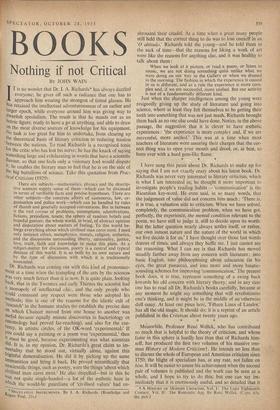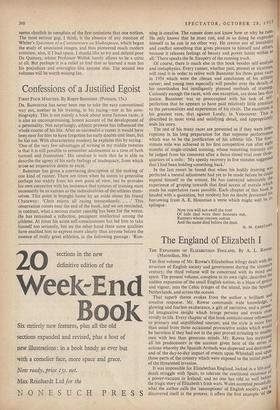BOO
if • • Nothing f not Critical BY JOHN WAIN IT is no wonder that Dr. I. A. Richards* has always dazzled everyone; he gives off, such a radiance that one has to approach him. wearing the strongest of tinted glasses. He has retained the intellectual adventurousness of an earlier and larger epoch, while everyone around him was giving way to dwarfish specialism. The result is that he stands out as an heroic figure, ready to have a go at anything, and able to draw °I1 the most diverse sources of knowledge for his equipment. No task is too great for him to undertake, from clearing up the theoretical basis of literary criticism to reducing tension between the nations. To read Richards is a recognised tonic for the critic who has lost his nerve; he has the knack of saying something large and exhilarating in words that have a scientific flavour, so that one feels only a visionary fool would dispute 'I: he enables the literary man to feel that he is on the side of the big battalions of science. Take this quotation from Prac- tical Criticism (1929):
There are subjects—mathematics, physics and the descrip- tive sciences supply some of them—which can be discussed in terms of verifiable facts and precise hypotheses. There arc other subjects—the concrete affairs of commerce, law, or- ganisation and police work—which can be handled by rules of thumb and generally accepted conventions. But in between is the vast corpus of problems, assumptions, adumbrations, fictions, prejudices, tenets; the .sphere of random beliefs and hopeful guesses; the whole world, in brief, of abstract opinion and disputation about matters of feeling. To this world be- longs everything about which civilised man cares most. I need only instance ethics, metaphysics, morals, religion, wsthetics, and the discussions surrounding liberty, nationality, justice, love, truth, faith and knowledge to make' this plain. As a subject-matter for discussion, poetry is a central and typical denizen of this world. It is so both by its own nature and by the type of discussion with which it is traditionally associated.
Dr. Richards was coming out with this kind of pronounce- ment at a time when the trampling of the arts by the science Was very much fiercer than it is now. It is quite plain. looking hack, that in the Twenties and early Thirties the scientist had 4 monopoly of intellectual chic, and the only people who could command any respect were those who adopted his Methods; this is one .of the reasons for the idiotic cult of `research' in the humane studies (to establish the precise date °n which Chaucer moved from one house to another was Useful because equally minute discoveries in bacteriology or entomology had proved far-reaching), and also for the cu.. rency, in artistic circles, of the OK-word `experimental/ If 'oil could say a painting or a poem was 'experimental,' then lt must be good, because experimenting was what scientists (lid. It is, in my opinion, Dr. Richards's great claim to im- Mortality that he stood out, virtually alone, against this frightful demotaliSation. He did it by picking up the same ammunition and firing it back. He proved scientifically that unscientific things, such as poetry, were the things 'about which civilised man cares most.' He also dispelled—but in this he was not quite single-handed—a lot of the wsthetic haze in Which the would-be guardians of 'civilised values' had en- , „ '' smcui ATM' INSTRUMENTS. By 'I. A. Richards. (Routledge and A.egan Paul. 21s.) shrouded their citadel. At a time when a great many people still held that the correct thing to do was to.lose oneself in an '0 altitudo,' Richards told the young—and he told them in the nick of time—that the reasons for liking a work of art were like the reasons for anything else, and it was healthy to talk about them:
When we look at a picture, or read. a poem, or listen to
music, we are not doing something quite unlike what we were doing on our way to the Gallery or when we dressed in the morning. The fashion in which the experience is caused in us is different, and as a rule the experience is more com- plex and, if we are successful, more unified. But our activity is not of a fundamentally different kind. Just When the sharper intelligences among the young were resignedly giving up the study of literature and going into science, where at least they felt themselves to be getting their teeth into something that was not just mush, Richards brought them back as no one else could have done. Notice, in the above passage, the suggestion that it is clever to have aesthetic experiences : 'the experience is more comp/ex and, if we are successful, more unified.' This was at a time when most teachers of literature were assuring their chargei that the cor- rect thing was to open your mouth and drool, or, at 'best, to burn ever with a hard gem-like flame. * ** I have sung this paean about Dr. Richards to make up for saying that I am not exactly crazy about his latest book. Dr. Richards was never very interested in literary criticism, which is what I am interested in; he thought it more important to investigate people's reading habits — 'communication' is the Ricardian key-word. He even said, in so many words, that the judgement of value did not concern hiin much : 'There is, it is true, a valuation side to criticism. When we have solved, completely, the communication problem, when we have got, perfectly, the experience, the mental condition relevant to the poem, we have still to judge it, still to decide upon its worth. But the latter question nearly always settles itself, or rather, our own inmost, nature and the nature of the world in which we live decide it for us.' I have thought over those last words dozens of times, and always they baffle me. I just cannot see the reasoning. What I can see is that Richards has moved steadily farther away from any concern with literature: into basic English, into philosophising about education (in his eyes, the great panacea), and into more and more lunatic- sounding Schemes for improving `communication.' The present book does, it is true, represent something of a swing back towards his old concern with literary theory; and in any ease one has to read all Dr. Richards's books carefully, because at any moment he might say something that will revolutionise one's thinking, and it might be in the middle of an "otherwise dull essay. At least one piece here, 'Fifteen Lines of Landor,' has all the old magic. It should do; it is a reprint of an article published in the Criterion about twenty years ago. * * * Mea• nwhile, Professor Rend Wellek, who has contributed so much that is helpful to the theory of criticism, and whose fame in this sphere is hardly less than that of Richards him- self, has produced the first two volumes of his massive one- man History of Modern Criticisntt. He intends no less than to discuss the whole of European and American criticism since 1750; the blight of specialism has, at any rate, not fallen on him. It will be easier to assess his achievement when the second pair of volumes is published and the work can be seen as a whole, and I hope to try to do this; but one can say im- mediately that it is enormously useful, and so detailed that it t A llisioRY OF MODERN CRITICISM. Vol, is The Later Eighteenth Century. Vol. 11: The Romantic Agq. By' Renzi \Vella:. (Cape, 63s. the pair.)
seems churlish to complain of the few omissions that one notices. The most serious gap, I think, is the absence of any mention of Whiter's Specimen of a Commentary on Shakespeare, which began the study of associated images, and thus pioneered much modern criticism; also, if I had space, I should like to try and defend poor De Quincey, whom Professor Wellek barely allows to be a critic at all. But perhaps it is a relief to find that so learned a man has his prejudices and oversights like anyone else. The second two volumes will be worth waiting for.



































 Previous page
Previous page